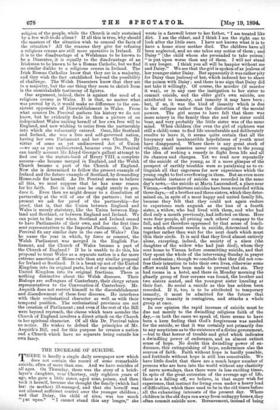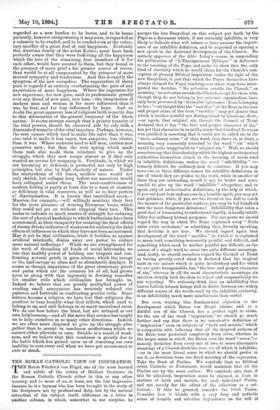THE INCREASE OF SUICIDE. T HERE is hardly a single daily
newspaper now which does not contain the record of some remarkable suicide, often of more than one. And we have suicides of all ages. On Thursday, there was the story of a brick- layer's daughter' near Chertsey, only eighteen years of age, who gave a little sister, aged nine, poison, and then took it herself, because she thought the family (which had lost its mother) ill-managed, and that she herself was not allowed sufficient control over the younger children ; and. that Daisy, the child of nine, was too much "put upon." "I cannot stand this any longer," she wrote in a farewell letter to her father, "I am treated like dirt. I am the eldest, and I think I am the right one to look after the little ones. I have not known what it is to have a home since mother died. The children have all been neglected, and no one takes any notice of them ; and Daisy" [the child whom she persuaded to take poison] "is put upon worse than any of them. I will not stand it any longer. I think you all will be happier without me and Daisy." We see that the girl is spoken of as jealous of her younger sister Daisy. But apparently it was rather pity for Daisy than jealousy of her, which induced her to share the poison with Daisy; and there is no sign that Daisy did not take it willingly-. Of course, the murder (if murder it was), or in any case the instigation to her sister to commit suicide, and the elder girl's own suicide, are attributed to insanity, and insanity it may have been ; but, if so, it was the kind of insanity which is due to the collapse rather than the distortion of the mental powers. The girl seems to have felt that there was more misery in the family than she and her sister could bear, and very probably the little sister was of the same mind. When children (for even the girl of eighteen was still a child) come to find life unendurable and deliberately resolve to leave it, it seems quite certain that all the buoyancy and inexhaustible hopefulness of youth must have disappeared. Where there is any great stock of vitality, small miseries never even suggest to the young the idea of seeking a remedy in flight from life and all its chances and changes. Yet we read now repeatedly of the suicide of the young, as if a mere glimpse of the prospect of earthly troubles were so paralysing as to ex- tinguish all that eagerness for new experience which the young ought to feel overflowing in them. But an even more remarkable instance of suicide was recorded in the same day's news,—the suicide at Maria Lanzendorf, a place near Vienna,—where thirteen suicides have been recorded within three days,—of a brother and three sisters, which they deter- mined on, in spite of a most happy and united family life, because they felt that they could not again endure to experience such anguish as the loss of a fourth sister, a widow, who had, lived with them, and who had died only a month previously, had inflicted on them. Here were four people, all prizing each others' company to the full, and not therefore oppressed by that sense of loneli- ness which oftenest results in suicide, determined to die together rather than wait for the next death which must thin their circle. It is said that they lived almost entirely alone, excepting, indeed, the society of a niece (the daughter of the widow who had just died), whom they sent home to Vienna before committing suicide, and that they spent the whole of the intervening Sunday in prayer and confession ; though we conclude that they did not con- fess their intention to take their own lives, otherwise some effort would have been made to prevent that sin. They had rooms in a hotel, and there on Monday morning the ghastly group of four corpses was found, the brother and. two sisters seated, and the youngest sister kneeling at their feet. So social a suicide as this has seldom been recorded. If it, too, is to be attributed to temporary insanity, it must be admitted for the future that temporary insanity is contagious, and attacks a whole group at once.
In our opinion the rapid increase of suicide must be due not merely to the dwindling religious faith of the day,—in both the cases we speak of, there seems to have been a keen feeling that God's forgiveness was needed for the suicide, so that it was certainly not primarily due to any scepticism as to the existence of a divine government, —but to that horror of trouble and grief which indicates a dwindling power of endurance, and an almost extinct sense of hope. No doubt this dwindling power of en- durance, this extinguishing of hope, undermines also the sources of faith. Faith without hope is hardly possible, and fortitude without hope is still less conceivable. We have little doubt that there are a much larger number of persons who are born into the world without any elasticity of nerve nowadays, than there were in less exciting times. In spite of the great extension of the average age of life, there is a falling off, we believe, in that eager wish for experience, that instinct for living even under a heavy load of difficulties, which there used to be in the old times before all the exhausting interests of the present day. Where children in the old days ran away from unhappy homes, they often commit suicide now. Bereavement, instead of being regarded as a new burden to be borne, and to be borne patiently, however overpowering it may seem, is regarded as a calamity to be evaded, and to be evaded even at the volun- tary sacrifice of a great deal of real happiness. Evidently this Austrian family of the artist Kolarz, must have been perfectly aware that they were forfeiting all the happiness which the love of the remaining four members of it for each other, would have secured to them, but they found in the prospect of more grief a far greater source of terror, than would be at all compensated by the prospect of more mutual sympathy and tenderness. And this is exactly the symptom of the new cowardice. The expectation of sharp pain is regarded as entirely overbalancing the gain of any expectation of mere happiness. Where the eagerness for new experience, for new gain, used to predominate greatly over any dread of new pain, new loss,—the imagination of modern man and woman is far more influenced than it was by fear, and far less influenced by hope. And no doubt the great apparent loss of religious faith is partly due to this attenuation of the general buoyancy of the whole nature. It seems strange enough that a greater tenacity of the vital powers, should be observed side by side with a diminished tenacity of the vital impulses. Perhaps, however, the very causes which tend to make life safer than it was, also tend to make it less eager, less sanguine, less elastic, than it was. Where rashness used to kill men, caution now preserves men ; but then the very spring which made them rash also made them reluctant to give up the struggle, which they now resign almost as if they only wanted an excuse for resigning it. Fortitude, in which we are becoming so deficient, is promoted not only by high principles, but also by high elasticity of nature. Under the martyrdoms of old times, modern men would not only shrink, but collapse long before our ancestors would have collapsed under them. The over-sensitiveness of modern feeling is partly at least due to a want of stamina or deficiency in vital resources, as well as to finer powers of discrimination. It is known that uncivilised races,— Maories, for example,—will willingly mutilate their feet for the mere pleasure of wearing European boots, which they could not get on without clipping their toes. This seems to indicate as much reserve of strength for enduring the sort of physical hardships to which barbarians have been accustomed, as their incapacity for resisting the fatal effects of strong drinks indicates of weakness for enduring the fatal effects of influences to which they have not been accustomed. May it not be that civilisation, while it fortifies us against artificial mischiefs, drains away our power to endure mere natural sufferings ? While we are strengthened for the work of threading all kinds of social labyrinths, we lose that healthy power of holding our tongues and con- fronting natural griefs in grim silence, which the savage or the half-savage so often and so abundantly displays. It seems as though impatience of the great elementary griefs and pains which are the common lot of all, had grown upon us along with that ingenuity in devising remedies for smaller evils which civilisation has brought us. Indeed we believe that our greatly multiplied power of evading small annoyances has seriously reduced our patience and fortitude in confronting greater evils. Since science became a religion, we have lost that religious dis- position to bear humbly what God inflicts, which used to belong to us, and still belongs to so many uncivilised races. We do not bow before the blast, but are irritated at our own helplessness,—and all the more that science has taught us to help ourselves in so many other directions. Indeed, we are often more disposed to give up the struggle alto- gether than to accept in meekness misfortunes which we cannot either alleviate or cure. Suicide is a result of weak- ness, and we believe that this weakness is greatly due to the habit which has gained upon us of resenting our own inability to cure every evil when we have got accustomed to cure so much.







































 Previous page
Previous page